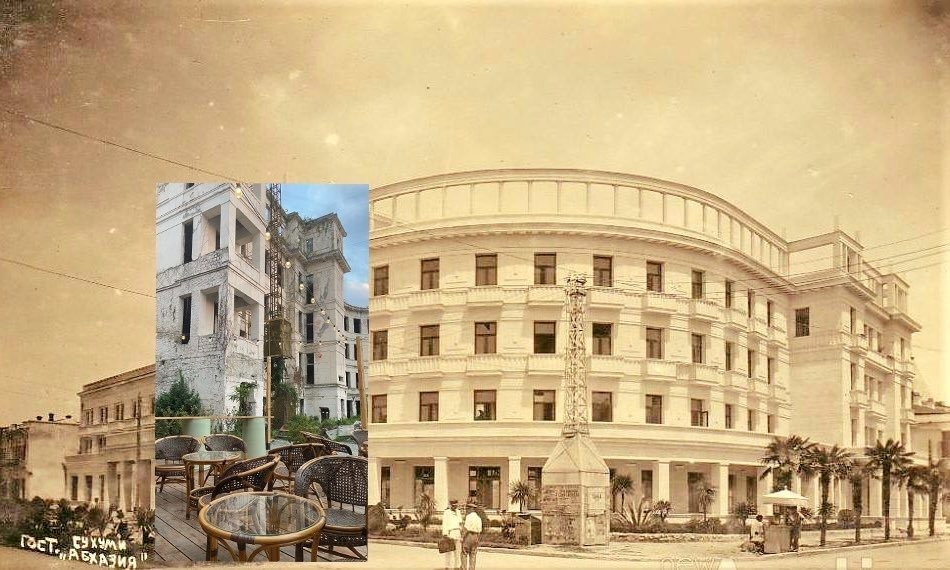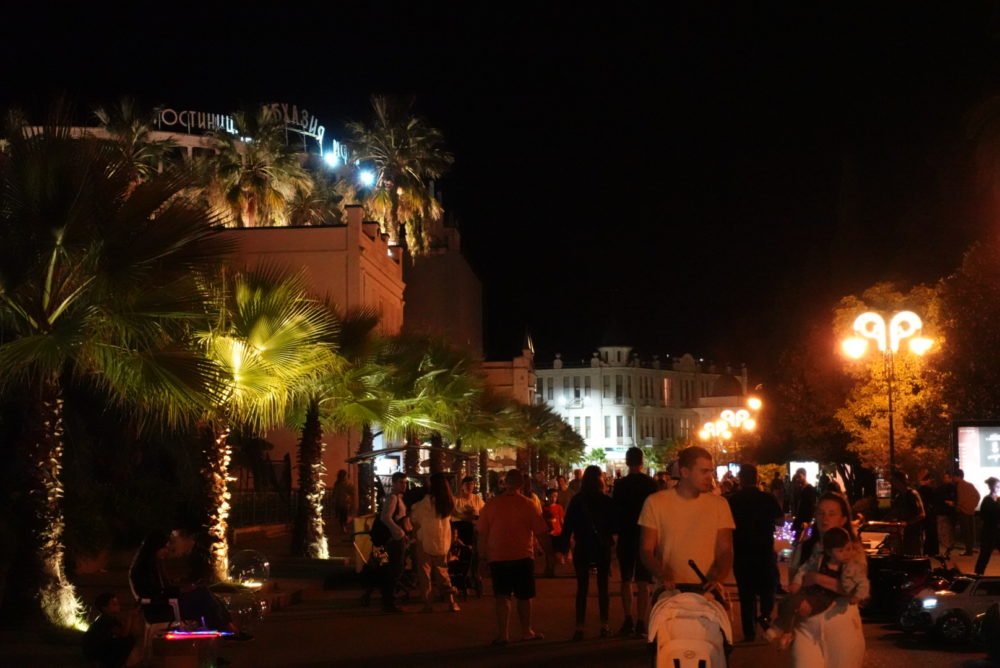
Each city ought to have its symbol. My hometown is Sukhum¹. It is not big, but it has a descriptive symbol. During Soviet times, many people perceived Hotel Abkhazia as just that. The hotel, built in the late 30s, is located in the most picturesque part of the city’s main promenade. This stretch begins with dragon fountains in front of the Abkhaz drama theater and extends through the colonnade above the Brekhalovka cafe, where Sukhum’s residents of different ages usually play backgammon and cards while sipping on their coffee.
It continues through a Turkish cafe and reaches a hipsterish coffee shop called Brigantine. The promenade is always full of the most flamboyant people you could see. Sometimes I feel as if they come straight from Fellini’s movies. Taking a walk there, one will witness many street performers, ranging from guitarists to violinists and singers. In this fairy-tale-like picture, there is this huge Hotel Abkhazia. Notwithstanding its size and the fact that no one may see the remnants of it, the Sukhum promenade is not a Sukhum promenade without it. It proudly overlooks the vibrancy of the city flowing under the rustling of palm trees and sea breeze.
Timur, a painter based in Sukhum, shares that Hotel Abkhazia and the part of the promenade it is located in were like a small Paris during Soviet times. It was always full of people dressed according to the latest fashion: men in white trousers and loafers, women in their feminine summer hats and vintage dresses. In the evening, Hotel Abkhazia looked like a scene straight from a movie. Local people who all knew each other, a crowd of tourists that created a constant flow of customers at a restaurant on the ground floor living their most picturesque life. As Timur remembers, people were unwilling to free their seats once they were done eating; they were sitting and enjoying their evening by the sea, while another crowd of customers was standing in line. All that created a peculiar flamboyancy for the promenade.
Unfortunately, the beauty of the promenade was disfigured in 1985. A fire broke out in the kitchen of the cafe on the ground floor and took over the whole building. As Timur reminisces, after the fire, the promenade went silent, and life became stagnant with it. Many believe that the fire at the hotel was bad luck and all the problems of Abkhazia started right after that. The old-timers of Sukhum used to say that there would be no prosperity and positive change while the hotel is not revived.
For decades after the fire and the war of 1992-1993, Hotel Abkhazia was abandoned, with memories of the once-vibrant place vanished in its remnants. The year 2023 saw a positive change. Abkhazia experienced a renaissance as a group of friends from Sukhum decided to open a bar inside it and give it the quite descriptive name Ruin.
As one of the founders of Ruin Bar, Adamur Arshba, shares, “With friends, we always wanted to have our own space for having fun and throwing parties. Thus came the idea to have our bar.” A group of entrepreneurs opened a small bar in a different spot in Sukhum.
As the idea proved itself successful, the group aimed to go bigger. One of the founders of Ruin always wanted to have a bar in the remnants of Hotel Abkhazia, right at the heart of Sukhum. The name of the bar suits its concept the best.
As Adamur shares, “The concept of the bar is not new. We all live in ruins as long as we remember ourselves; it’s close to us. We just embellished it a bit.”
The bar introduced the newest, unusual vibe for modern Sukhum. It boosted the nightlife of the city. Many visitors claim that nothing like it was popular in the capital before. Some compare it to European bars. On top of that, Ruin bar became a space for promising artists of Abkhazia. Amateur DJs throw parties there and impress citizens with the beats of their music sets.
Local painters have the opportunity to exhibit their works inside the walls of Ruin. In a nutshell, the bar represents a platform for introducing the freshest, newest vibe of fun and creativity the city has not seen for a while now. Adamur expresses hope that the opening of the bar is a small step on the long, thorny way of Abkhazia to prosperity.
Omar, one of the frequent guests of Ruin, describes the bar as something the people of Sukhum always wanted but never had before. He also shares that the bar being located in ruins is the best part of it.
“Our life was always about ruins, but still, we knew how to have fun, how to enjoy our life, and the concept suits our reality perfectly.”
- Georgians calls it Sukhumi.

Archived comments
Georgians call it SOkhumi*
Beautiful city. Nice article. Good job!